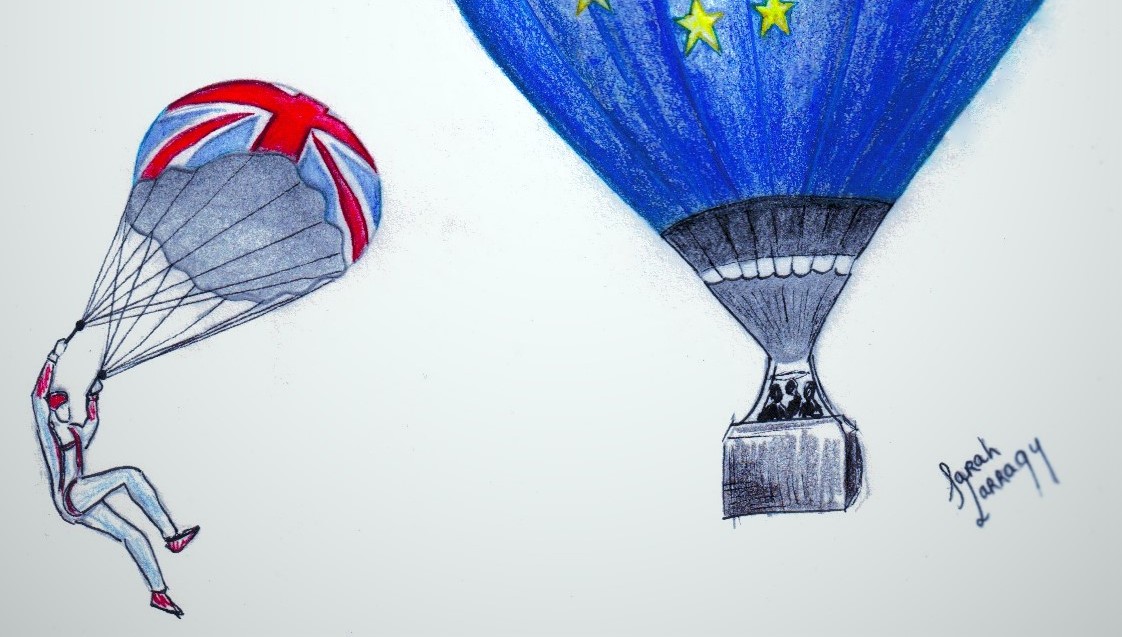The Society for International Affairs (SOFIA) hosted Andrew Byrne, European correspondent for The Sunday Times, to give his take on Brexit last night. Byrne, a Trinity alumnus and former President of Trinity College Student’s Union, noted the sizeable attendance at the event in his opening remarks despite the topic at hand not being a “particularly interesting or sexy one”.
He highlighted the stark contrast between the present and his time as an undergraduate when he first entered Trinity in 2003. “At that time Britain had a Europhile Prime Minister, the EU had begun expanding with many of the Eastern Bloc countries such as Poland joining”. Informing the audience that he would focus on certain areas in his address and that he would endeavour to do this in “the least boring way possible”.
Byrne made it very clear that he could not give an accurate prediction of what to expect from one of the most polarising political events in recent history. “Anyone who came here tonight and thought they knew what’s going to happen in the next few months would be lying to you”. Byrne made it clear that time is of the essence in Brexit negotiations with an EU summit in Brussels on October 17 and a tight schedule of deadline’s before the official Brexit deadline of March 29 next year.
The uncertainty created by Brexit, for both the EU and Britain, has been the most prominent feature of the negotiations up to this point, he continued. “If anything we should probably feel a little bit of sympathy for the British government as it is going through such a complicated undertaking”.
“For Britain, it has received a rude awakening in the negotiating process as it is realized how difficult it is to negotiate with the EU as a single trading bloc”, said Byrne. “May had thought she could circumnavigate around [EU chief Brexit negotiator] Michel Barnier, and deal with EU leaders directly if anything the summit in Salzburg was a sorry end for that strategy and was effectively a humiliation for Britain”.
Byrne questioned the logic of Brexiteers in what they hoped to achieve through leaving the EU. “The idea of taking back control over one’s borders doesn’t seem to hold much weight with voters when Britain won’t even have control over its own land border with the EU should Northern Ireland remain in the customs union”. The idea that a ‘return to a global Britain’ also had a few flaws that backers of Brexit had not foreseen. He added, “The reality is that in the immediate years following Brexit, the UK will have to spend most of its energy negotiating a trade deal with the EU, its largest trade partner”.
Byrne concluded his talk with his analysis of the current internal political climate of Britain and how that has affected negotiations over Brexit. Noting that Theresa May was fighting a war on two fronts due to growing discontent amongst the hardline Brexiteers in her own party along with Brexit. Byrne was more optimistic about May retaining her premiership, stating that the one thing they feared more than a soft Brexit or a ‘Brexit in name only’ (BRINO) and that was a general election and the possibility of the Labour Party winning with Jeremy Corbyn as PM. Giving his best attempt at a prediction he concluded by saying “My prediction is that BRINO will pass but it will be a very painful process for the UK in passing it”.
Byrne then took questions from the audience, one of which was whether it was in Irish interests that Britain had a soft landing in their exit from the EU. “I don’t think to punish Britain over Brexit would be in Irish interests”, he began and then alluded to a recent report conducted by Ireland’s Central Statistics Office (CSO) that concluded the vast majority of Irish exporters ship their goods to Britain. Another question from the audience was how Brexit would affect the future of graduates such as those in the audience. Byrne joked “I’m trying not to be pessimistic, but then again I wouldn’t have chosen to speak on such a topic otherwise”, he continued that “there’s a huge political will amongst students and EU citizens as a whole that Britain will not mistreat them should they pursue a career or future in the UK”.






